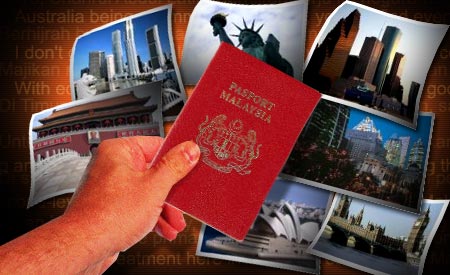
YOURSAY | ‘I can't understand why I have no right to know why I barred from travelling.’
 Kim Quek: The Court of Appeal is wrong to rule that the Immigration director-general has absolute power to ban foreign travel on any individual by not having to give any reason for the ban.
Kim Quek: The Court of Appeal is wrong to rule that the Immigration director-general has absolute power to ban foreign travel on any individual by not having to give any reason for the ban.
For, in a country with rule of law, no one - least of all, a government officer - should be given such absolute power to curtail the personal liberty of any individual.
The court is also wrong to interpret Article 5 of the Federal Constitution (which guarantees personal liberty) so narrowly that it is restricted to be applied only on cases of unlawful detention.
On the contrary, this Article ought to be interpreted in the broadest sense, as personal liberty is the cornerstone of the fundamental concepts of all democratic systems of government, of which Malaysia belongs, as defined by its constitution.
Petaling Jaya Utara MP Tony Pua must fight to uphold this sacrosanct principle up to the highest court of the land.
Anonymous 381541456985626: I may agree that a valid passport does not automatically give a citizen the right to travel abroad.
But I can't understand why I have no right to know why I banned or barred from travelling. It is perplexing and worrying, as it impeaches on the right of a citizen.
Quigonbond: I don't need some appellate court to tell me what's right or wrong. In this global age, whether someone can travel to another country is determined by that country's entry requirements.
With a Malaysian passport, countries that have agreed for Malaysians to enter will allow entry. The country of origin should not have the right to determine whether someone has the right to travel overseas or otherwise.
If you want to restrict someone from travelling overseas, you need to provide a good reason. That's why suspects have their passports impounded.
Just because something is not in the constitution is reason enough for there not to be a prohibition, not the other way around.
Wira: What is the purpose of a passport? Obviously for identification when one is abroad. The request by our government for assistance to countries approved for travel by the passport is also stated very clearly in it.
The citizen's right to a passport inherently grants the holder a right to travel. Otherwise, we might as well not issue one to those people whom the government thinks should not have one.
The court should have been called to make a decision on whether a passport is a right or a privilege as a right to a passport automatically confers the right to travel, subject to legal control where the reason for prohibition must be given by the authorities.
6th Generation Immigrant: Both courts (High Court and Court of Appeal) have very narrow views, which is only interpretable from Malaysia's narrow and insular definitions; they cannot be seen through universal lenses.
Where is the international consistency? It may be true that the right to travel abroad was not a constitutional right for all, but surely when a passport is initially applied for, approved and eventually released, that the constitutional right to travel had already been weighed, otherwise why issue a passport at all?
When a passport (travel documentation) is issued in any country, it signifies an official document issued by a government, certifying the holder's identity and citizenship and entitling them to travel under its protection to and from foreign countries.
Our courts have now put up some ridiculous arguments on why citizens (in Malaysia) require passports - a means to collect revenue by the government but with no assurances that one can travel abroad.
Secondly, why the need to surrender passports in criminal cases?
Enggang: Immigration issues passports as a source of revenue for the state. They then can turn around to tell you that you cannot travel because you pose a danger to Barisan Nasional’s security.
How? When you as opposition politicians travel, your motive is to further your political causes, one of which is to persuade fellow citizens working abroad to vote against the BN in the next election.
Limfly: We have become prisoners in our own country; only free to travel abroad if the wardens give us permission.
Well Thats Fantastic: Article 13 of the Universal Declaration of Human Rights, adopted by the UN General Assembly, reads:
1) Everyone has the right to freedom of movement and residence within the borders of each State.
2) Everyone has the right to leave any country, including his own, and to return to his country.
Analyser: But then, Malaysia is not a signatory to this UN declaration. The opposition has never given any indication that, in their righteousness, they would sign. I guess that means Pua is up the creek without a paddle.
There is so much the opposition could do which wouldn’t cost a cent. One is forced to ask why?
Quigonbond: By way of response to Analyser, please google before you generalise that the opposition has not asked for Malaysia to sign the Universal Declaration of Human Rights.
Vote BN Out: It may be a privilege but every citizen has a right to that privilege not to be abused by the authorities for no good reason. That should be the basis of argument.
And a judicial review must be accorded when a breach of that right occurs.
Anonymous 759201436321741: Hmm. Have right to a passport but not the right to travel unless Immigration says so.
Now here is a possible law from the prison warden. You have the right to free food. But you do not have the right to eat unless he says so. Malaysia Boleh.- Mkini


No comments:
Post a Comment
Note: Only a member of this blog may post a comment.